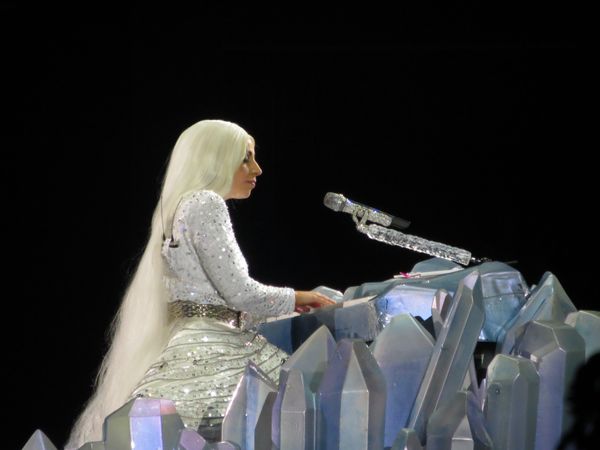Litany
By Billy Collins
You are the bread and the knife,
The crystal goblet and the wine...
Jacques Crickillon
You are the bread and the knife,
the crystal goblet and the wine.
You are the dew on the morning grass
and the burning wheel of the sun.
5 You are the white apron of the baker,
and the marsh birds suddenly in flight.
However, you are not the wind in the orchard,
the plums on the counter,
or the house of cards.
10 And you are certainly not the pine-scented air.
There is just no way that you are the pine-scented air.
It is possible that you are the fish under the bridge,
maybe even the pigeon on the general's head,
but you are not even close
15 to being the field of cornflowers at dusk.
And a quick look in the mirror will show
that you are neither the boots in the corner
nor the boat asleep in its boathouse.
It might interest you to know,
20 speaking of the plentiful imagery of the world,
that I am the sound of rain on the roof.
I also happen to be the shooting star,
the evening paper blowing down an alley
and the basket of chestnuts on the kitchen table.
25 I am also the moon in the trees
and the blind woman's tea cup.
But don't worry, I'm not the bread and the knife.
You are still the bread and the knife.
You will always be the bread and the knife,
30 not to mention the crystal goblet and--somehow--the wine.
Litany written by Billy Collins is a comparison poem that derives from the works of Jacques Crickillon . Collins served as the US Poet Laureate from 2001-2003, and was the New York State Poet Laureate from 2004-2006. His poetry has been described as conversational, witty humor that is an observational view on everyday life. Collins first book to be published outside the U.S was Taking off Emily Dickinson’s Clothes (Written in 2000) and he has been published frequently ever since, his most recent tittle being Horoscopes for the Dead (Written in 2011). (Poetry Foundation).
The poem is a product of a series of poems that Collins made, in which he takes the first two lines from another poets work, and makes them the first two lines of his work. The poem follows a structure, a poetic device in which the poet compares the beloved to various things in the world. This style of poetry first showed itself in the middle ages, and was derived again in western love poetry. Collins's poem has a slight curve, however, and that is the use of humor and satire.
Collins utilizes cliché as a poetic device to portray his satire. This is shown in lines that compare the overly expected, such as “the dew on the morning grass” (line 3) or “the evening paper blowing down an alley” (Line 23). These are images that we have seen arise in many works, and when comparing someone to something beautiful, these are images that are prominent.
Still, There is something more than satirical in collins's comparisons: “you are the bread and the knife” (Line 1) this line alone is pure beauty; the bread signifies life, the desperate need for substance of food to survive. The knife signifies the want, you don't need a knife to cut the bread (you could easily tear it apart with your fingers), but you want the knife because it is a more elegant way to cut the bread. The marriage of the two (bread = life, knife=elegancy) creates a gentleness, a delicacy that brings you back to the goal of the comparison, which is the comparison to the beloved.
Collins carries this imagery throughout the poem, but predominantly in the first and third stanzas. In the second and fourth stanzas, Collins does the opposite. Instead of saying “you are” he says “you are not”;
“However, you are not the wind in the orchard,” (Line 7)
. . .
“but you are not even close
to being the field of cornflowers at dusk. ” (Lines 14-15)
Collins deepens the satirical metaphor with this use of opposite point of view. It allows him to engage the reader in a different direction and keep the poem relevant; because a 30 line poem that is comparing someone to something over and over again gets boring and the reader becomes disinterested. Collins, however, changes the wording in such a slight way that we as readers may not realize it in first read. We just recognize the satirical foreplay. Like lines 10-11;
“And you are certainly not the pine-scented air.
There is just no way that you are the pine-scented air.” (Lines 10-11)
By repeating this line, Collins is able to emphasize the notion of you are not this, you cannot be this, you will never be this; because you are these things.
Collins moves from the you to the I at about the halfway point of the poem. These lines seem less congruent to the reader, but flow nicely and ultimately help to deepen the comparisons.
“It might interest you to know,
speaking of the plentiful imagery of the world,
that I am the sound of rain on the roof. ” (Lines 19-21)
Collins throws us off by going from the you to the I, but follows up with yet another cliché of rain on the roof.
Everything Collins does up until the 22 line sets the poem up to ultimately split itself in half, so that the You and the I are symmetrical and mirror each other.
“I also happen to be the shooting star,
the evening paper blowing down an alley
and the basket of chestnuts on the kitchen table.
I am also the moon in the trees
and the blind woman's tea cup. ” (Lines 19-24)
This is when we see the comeback of over expected lines and clichés. By doing this, the poet is making the lines talk to each other, in the senses that they might say, “I am appreciating what you are, and I am laughing at what you are not. But look at what I am, and look at what I am not. Laugh with me.”
Collins ends the poem exactly how he starts the poem. He brings the point of view lens from the broad, to the close up, back to the broad. It becomes this overarching thematic satire that leaves the reader feeling contempt and complete. The poem does not raise any questions, but rather treats the reader like the you in the poem. As the You, one cannot argue with the lines because they are merely facts; nothing is suggested. The lines have already been determined as true;
“But don't worry, I'm not the bread and the knife.
You are still the bread and the knife.
You will always be the bread and the knife,
not to mention the crystal goblet and--somehow--the wine.” (Lines 27-30)
Collins wraps it all up to; You are this metaphor, I am a different metaphor. I can never be you, and you can never be me. So let's be together, because we are two halves that make up the entirety of this metaphorical symmetry.




















